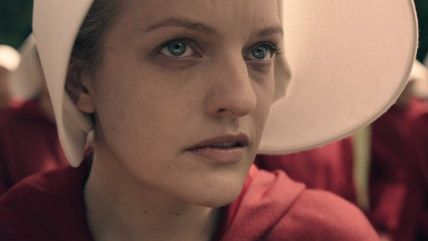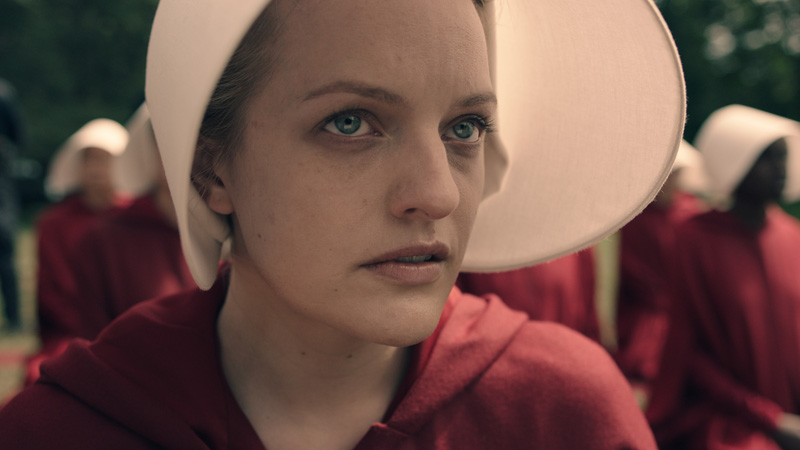The Handmaid's Tale Lands an Excellent Adaptation
Also reviewed: Great News on NBC


Great News. NBC. Tuesday, April 25, 9 p.m.
The Handmaid's Tale. Hulu. Available Wednesday, April 26.
When The Handmaid's Tale, Margaret Atwood's account of a totalitarian takeover of America by a religious cult that reduces women to breeding stock, first appeared in 1985, it was instantly acclaimed as a feminist 1984 that exposed the misogyny not only of evangelical Christianity but of men in general. In short order, Atwood's novel was adapted to stage productions, radio plays, a ballet, an opera, and a messy Volker Schlöndorff film starring Natasha Richardson and Faye Dunaway.
But the precise nature of Atwood's message was always a little more slippery than feminist critics let on. The Handmaid's Tale was written while Atwood was living in what was then still known as West Berlin, closely studying what was happening on the other side of the wall, and many of the novel's totalitarian devices (particularly self-criticism sessions in which women rip their own psyches to shreds at a brainwashing factory suggestively called the Red Center) are drawn from the playbook not of the Westboro Baptist Church but the Marxist regimes of the day. And the rigid class system of The Handmaid's Tale, in which some groups of women (particularly wives, daughters, and concubines of male leaders) were treated much better than male laborers seemed to mock male chauvinism less that the Soviet system of nomenklatura privilege.
Then there are the anti-porn rants of the government apparatchiks in The Handmaid's Tale and their conflation of sex with rape, which sound suspiciously like the rhetoric of 1980s feminist groups like Take Back the Night. Was Atwood really stroking feminists, or needling them?
That ambiguity remains in the latest and, by far, best incarnation of The Handmaid's Tale, the 10-hour miniseries that Hulu unveils this week. Though the three episodes Hulu made available for review lean somewhat more heavily on the tensions of resistance to a powerful totalitarian state, the show still seems to be firing potshots at targets all along the ideological and cultural spectrums.
Certainly the feminist element is still strongly present. Elisabeth Moss of Mad Men stars as Offred—a contraction of the phrase "of Fred," connoting her status as the indentured sexual surrogate of Frederick Waterford (Josesph Fiennes), a high-ranking member of the ruling class of Gilead, the theocracy that has replaced the United States.
What, exactly, led to the creation of Gilead remains largely untold, though there are references to a mass assassination of the U.S. Senate and vast toxic waste spills. (Whether the latter were contributors to or results of the government's collapse is unclear.) What is certain is that the new regime has imposed a strict caste system that is particularly brutal toward women.
With female sterility rampant in the wake of the environmental catastrophes, the few women like Offred who are still capable of bearing children have been designated "handmaids," assigned to powerful men ("commanders") for a monthly session of joyless, clinical sex aimed solely at reproduction.
However demeaning, the breeding is less hazardous than the ferocious jealousies of the wives of commanders, the domestic-servant Marthas, and even other handmaids, who are encouraged to spy on one another. One of the most horrifying scenes in The Handmaid's Tale is a Dante-esque tableau of handmaids chanting "Whose fault? Her fault!" at a gang-rape victim.
Missteps are fatal: Either slowly, through reassignment to cleaning up toxic waste in the ominously named Colonies, or quickly, through impromptu hangings. The city bristles with dangling corpses of errant women, renegade Catholics and Quakers, and gay men, the latter chillingly referred to as "gender traitors."
In a society so ruthlessly Stalinist in methodology if not ideology, so riddled with informers and secret police, resistance seems not just impossible but inconceivable. When Offred gets an invitation to "join us" from an underground group (delivered by a handmaid who has concealed her feelings so primly that Offred considered her "a pious little shit with a broomstick up her ass") it is literally unbelievable to her: "There's an us?"
Moss' brilliant conveyance of the strangling mental claustrophobia of life in a totalitarian lockbox is the major force driving The Handmaid's Tale. She's helped immensely by the wise decision of the show's executive producer, Bruce Miller, to employ voiceover narration to express the interior monologues that were the spinal column of the novel. It was Schlöndorff's refusal to use voiceover in his film that defeated a series of screenwriters (including Atwood herself) and left Natasha Richardson wandering around with the apparent detachment of a lobotomy victim.
The contrast between Moss' stoic mien and her raging interior bangs up against the choleric, vengeful performance of Yvonne Strahovski (Chuck, Dexter) as the commander's wife to spectacular effect. Strahovski, so strikingly desexualized that she's scarcely recognizable, fascinatingly embodies all the seemingly contradictory impulses of The Handmaid's Tale toward feminism: Locked out of male society, her response is not solidarity with other women but spiteful cruelty toward them. There will doubtless be much written about the importance of The Handmaid's Tale in the Age of Trump, but the fact is that the worst tormenters of women in this story are other women.
Intragender hostility is also at the heart of NBC's new sitcom Great News, but it's played strictly—and rather successfully—for laughs. The protagonists in this case are Katie (Briga Heelan, Cougar Town), a career-stalled 30-something producer at a wildly dysfunctional TV news-magazine show, and Carol (SCTV veteran Andrea Martin), her 60-something mother who's bored with lunching with the ladies.
Deciding to take a community-college course in journalism to learn more about her daughter's career, Carol learns one of the requirements is doing an internship—and she promptly lands one on Katie's show. Soon enough, Carol's sunny this-is-just-a-lark outlook is making her a lot more popular than her teeth-grittingly ambitious daughter.
If this sounds kind of—dare I say it?—bitchy, it's not. Written, produced, and often acted by various figures from the extended Saturday Night Live/Tina Fey television family (Fey herself produces, and at least half a dozen alumni of either SNL or her shows 30 Rock and Unbreakable Kimmy Schmidt dot the cast and crew), Great News is amiable even when baring its claws. Call it 30 Rock Lite, a slightly less subversive television-workplace comedy peopled by loopy eccentrics too goofy to be mean for long.
Chief among them is Carol, who has mad quilting props, worships at the elderly-hipster boutique Chico's and has a best friend named Other Carol, or did, anyway, until Other Carol's inauspicious last birthday. Carol got the intern gig partly because the company got diversity points for hiring "an old" and partly because she's the only one who can communicate with the news show's ungracefully aging senior anchor Chuck (John Michael Higgins, Bob's Burgers), who's given to boasts like, "I shot a flaming arrow at Mike Wallace's Viking funeral."
Then there's Chuck's earnestly airheaded co-anchor Portia (reality-show princess Nicole Ritchie), who, told he once worked with Walter Cronkite, guilelessly asks: "What's a Walter Cronkite?" Not that Portia doesn't do some bragging of her own, especially about "my mentor, Roger Ailes."
Great News will not only make you laugh some, but will answer some important questions. One is that yes, Richie is not just bimbo set dressing but a surprisingly capable comedienne. And another is that no, apparently it's not too soon for James Gandolfini heart attack jokes.


Show Comments (20)